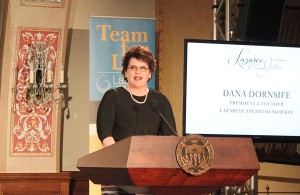USC hosts Lazarex Cancer Foundation gala
On Sept. 18, USC hosted the 2nd Annual Southern California Lazarex Cancer Foundation Gala to honor former Los Angeles City Council Member William Rosendahl, the first recipient of the foundation’s Victory Award. Notable attendees included President C.L. Max Nikias, former California Gov. Gray Davis and Olympic gold medalist Charlie White.

Fighting on · Dana Dornsife, founder of the Lazarex Cancer Foundation, speaks at the organization’s second annual gala Thursday at Town and Gown. Dornsife’s brother-in-law, Mike Miller, was diagnosed with cancer. – Kevin Fohrer | Daily Trojan
Rosendahl was diagnosed with cancer in 2012 and told he would die within a few months. He is still fighting, and has a message for those were given the same bleak news that he was.
“I would be very hopeful and excited because they’re coming up with all kinds of new strategies,” Rosendahl said. “I want them to realize that here I am, two-and-a-half years later, stronger now than I was two-and-a-half years ago, and that you have to be positive and you have to want to live.”
Grey Davis praised Rosendahl and the Lazarex Foundation for their support in fighting cancer.
“I don’t know anybody who brought more joy and more determination to overcome adversity than Bill Rosendahl,” he said. “The Lazarex organization is in the business of saving lives, and that’s exactly what they do. There is no better cause helping people deal with the end stage of cancer.”
When Dana Dornsife’s brother-in-law Mike Miller was diagnosed with cancer, it was the success of clinical trials that allowed him to live long enough so that his children would remember him. The experience inspired Dornsife to found the Lazarex Cancer Foundation, a one-of-a-kind nonprofit organization that links cancer patients with FDA-approved clinical trials and provides financial support for their treatment and travel costs. Dana Dornsife and her husband David are the namesakes of the Dornsife College of Letters, Arts and Sciences.
“When you reach the point in your battle with cancer when your doctor sits across from you and says, ‘I’m sorry there is nothing more that can be done,’ that is when Lazarex steps in,” Dornsife told the Daily Trojan. “Your doctor may not have any more that they can do, but there are things that can be done.”
Dornsife, who worked with Miller to find clinical trials for his treatment, started getting calls from people he had connected with during his treatment, asking if she could share her experience with them.
But for some patients, getting to the clinical trials wasn’t easy.
“There was this whole buildup of hope, where they were thinking, ‘There really is so much out there for me.’” Dornsife said. “But they bar-none came back to me and said, ‘I can’t do that. I can’t afford it. I can’t make that financial commitment.’”
Dornsife was concerned that people were unable to afford potentially life-saving treatment.
“That is so morally and fundamentally wrong that these people who were just as loved by their family members were not going to be able to have the opportunity that Mike had because of the size of their checkbook,” she said.
And so, in 2006, the Lazarex Cancer Foundation was born.
Lazarex’s mission is to match cancer patients to FDA clinical trials and to cover travel costs for each patient and companion, a mission that has been successful in extending the lives of many battling cancer. Even if patients can afford the treatments, Lazarex can help them navigate the confusing web of options to see which they best qualify for.
Dornsife discussed how the Lazarex Foundation not only hopes to help those in need of clinical trials, but also how the foundation hopes to radically change the future of cancer treatment, which she said isn’t focused enough on the importance of connecting patients to clinical trials.
“Every drug that we have available today is available as a result of completing a successful clinical trial,” Dornsife said. “Unless we are able to enroll and engage patients and complete that research loop by successfully completing a clinical trial, we’re not going to get new drugs, treatments or cures on the marketplace.”
Though research is important, Dornsife said, the overemphasis on research to cure cancer is misguided.
“The thing that I find very frustrating is that everybody talks about research, and we spend billions and billions of dollars [in] lab, but then when you go the bedside, the onus [of] finding out [about] and participating in a clinical trial is placed on the shoulders of the patient,” she said. “It doesn’t make any sense.”
Dornsife said that though Lazarex will never be able to afford to help all cancer patients, she hopes the program will inspire changes in the way cancer is treated. The foundation has developed a partnership called Improved Patient Access to Clinical Trials with organizations such as the USC Norris Comprehensive Cancer Center to support clinical trials, educate the community and urge physicians to make them a bigger part of their treatment plans.
Dornsife says the ultimate goal is for people not to need the foundation for assistance, and to reach a world where clinical trials are so widely used and funded that Lazarex doesn’t have to step in.
“That’s the ultimate vision,” she said. “To put myself out of business.”

